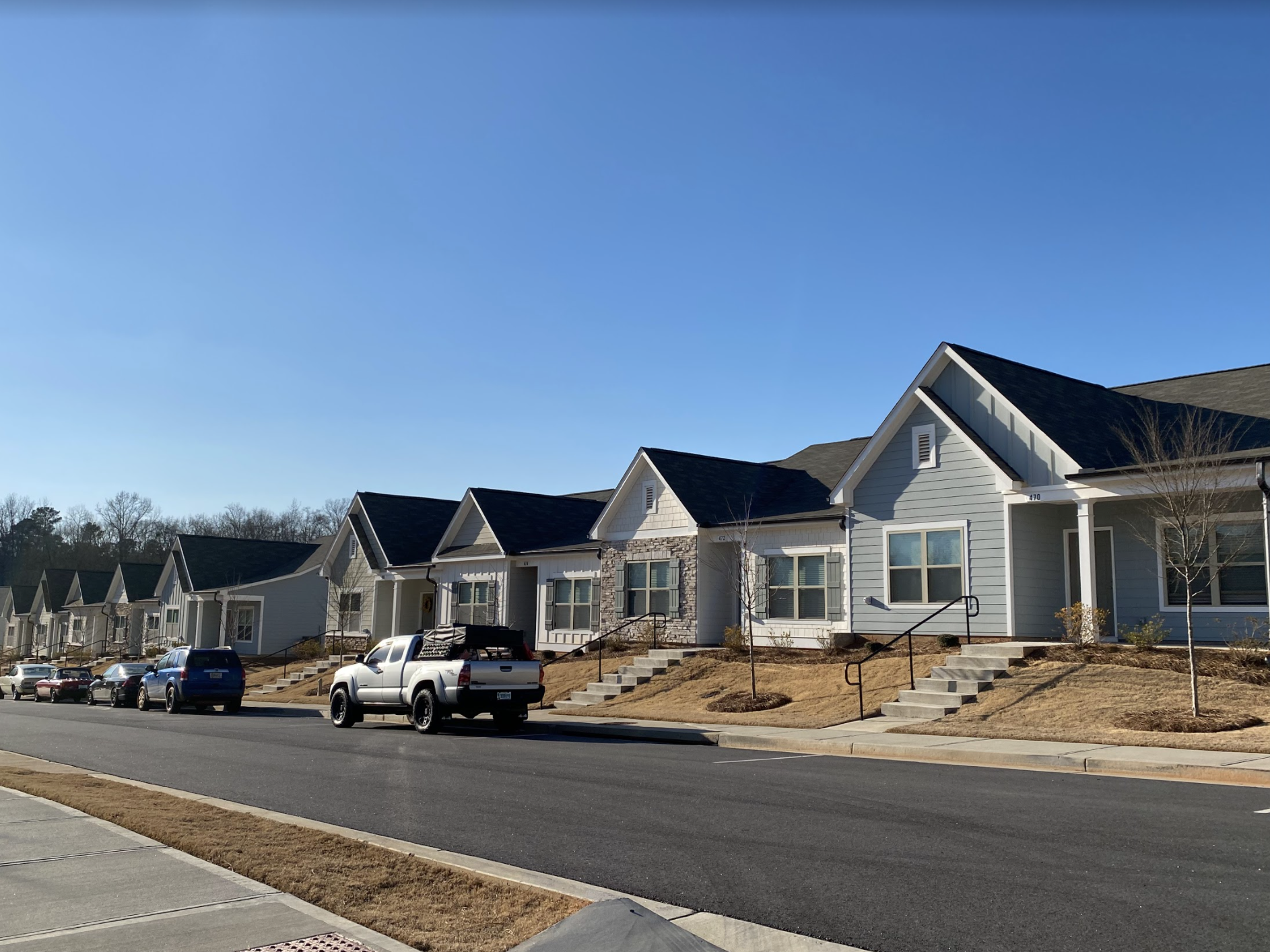Buying a home is becoming more expensive, even in small towns in Northeast Georgia.
Housing prices in the area experienced three-year highs toward the end of last year, as low mortgage rates prompted the demand for single-family homes to outweigh the available supply. This creates a phenomenon called a “seller’s market,” where individuals putting their homes on the market have more control over pricing.
The shortage of materials used to build new houses and the demand for larger homes are both effects of the pandemic, along with the migration of residents from metropolitan areas to suburban areas and small towns. As work-from-home business models spread across the country, workers look to move further away from central business districts and closer to areas that offer more square footage for their money.
While decreasing mortgage rates should make homeownership more achievable, inflation plays a role in housing price increases, rendering millennials and Generation Zers less capable of purchasing homes. These generations are most affected by the issue of rising prices combined with stagnant wages.
However, the increase in new developments is also driving up prices for rentals, making it more difficult for residents to afford a place to live.
In response to the hyperactive real estate market, buyers have turned to build-to-rent single-family homes, which combine elements of homeownership and multifamily renting.
Why It’s Newsworthy: Investors broadening the build-to-rent market are depriving real estate agents from sales and the general public from better chances of homeownership. These effects are especially detrimental in a seller’s market, where overall home supply is at a low.Build-to-Rent Defined
Build-to-rent homes are houses specifically built to be rented out to tenants.
While rentable single-family homes have existed for decades, communities of single-family homes built solely for renting first began appearing in 2015. Single-family rental communities have since expanded across the country, with 50,000 new units completed in 2020 alone. According to a report from Northmarq, a company that connects commercial real estate investors to experts in debt and loan servicing, single-family rental community growth was greatest in the southern United States in 2020, followed by the Midwest.
These rental communities offer the amenities of a single-family home without the drawbacks of homeownership. While each community differs, a standard home could have two to three bedrooms, a one- or two-car garage and lawns to manage.
Single-family rentals appeal to a variety of demographics, especially families who cannot be approved for a loan through a bank in order to purchase a home of their own.
BTR and the Real Estate Market
Build-to-rent offers an alternative to purchasing a home, but this alternative grows powerful at the expense of the real estate market.
Sylvan Cown, broker of real estate and property management company Our Town Realty in Athens, said this new business model could create a problem for real estate agents in the future, as it removes agents from the housing equation almost entirely.
“[The developers] come in, they buy the land, they build, they rent,” Cown said. “Unless you’re the realtor that sold them the land originally, [it basically cuts you out].”
Build-to-rent developers also remove developing opportunities from brokerages when they buy up property in a given area and convert it into rentable housing.
In regard to land mass, Athens-Clarke County is the smallest of the 159 counties in Georgia, meaning there’s only so much space to build and expand. Cown said the build-to-rent market’s takeover of the city could push residents into the counties surrounding Athens as prices within the city limits and county lines continue to increase.
Despite low interest rates, the real estate market still faces unsteadiness. Cown said the supply chain backup is responsible for fewer homes being built and placed on the market, resulting in a situation where consumer demand exceeds supply.
“We just can’t get stuff here fast enough,” Cown said, referring to building materials for new construction. “[Developers] are just going to get [materials] faster and throw those [rental homes] out fast.”
On the other hand, Grace Williamson, an agent at Our Town Realty, said she remains hopeful real estate agents won’t be outpaced in the future.
“I expect that an increase of BTRs and SFRs will create some competition for Realtors,” Williamson said. “Though that is something most agents in this market have become very accustomed to!”
BTR in Athens
College towns like Athens tend to have a larger rental presence due to the in-and-out migration of students each academic year. Property management companies have created an industry of developing off-campus student housing complexes within college towns all over the country. Build-to-rent appears to be their next business venture.
Landmark Properties, a property management company headquartered in Athens, announced it would enter the build-to-rent market in a release posted on their website on July 1 of last year. The self-proclaimed “nation’s top developer of student housing” said its desire to seize new opportunities for company growth was a motivation for entering the build-to-rent market.
“As our country and region navigate a demographic transition, we are well positioned to develop and build a variety of housing types for not just college students but others who desire an unmatched rental experience,” CEO and president of Landmark Wes Rogers said in the announcement.
According to the release, Landmark plans to implement this business model in order to reach out to new demographics of renters in the Atlanta area. The company also announced plans of opening an Atlanta office in the Buckhead neighborhood in the same release. The new office was scheduled to open last fall.
Developers based around Atlanta are also setting their sights on the Northeast Georgia area. Jim Chapman Communities wrapped up construction of The Cottages at Ridge Pointe in February of 2020, one of three single-family rental communities dispersed across Georgia. Six more communities are expected to open later this year in the state. JPMorgan Chase was announced to have purchased the community in March of 2021 and recruited RangeWater Real Estate, an agency based in Atlanta, to manage it.
Crystal McNamara, an employee at The Cottages at Ridge Pointe, said the community is open to anyone who can pass a background and credit check and can prove they are financially capable of paying rent on time each month.
McNamara said RangeWater charges its renters a $110 monthly community fee, which alleviates renters from handling their own trash pickup, recycling, maintenance, lawn care and pest control. The additional costs also cover usage and upkeep of the community’s public amenities, which include an outdoor swimming pool, pet park and fitness center.
“It’s pretty much run like a regular apartment community,” she said.
Jim Chapman Communities built another single-family rental community in Athens on the East Side called The Cottages at Lexington. The property offers amenities similar to its sister community as well as similar floor plans.
BTR in Northeast Georgia
Other parts of northeast Georgia could be the next target in BTR developers’ business plans.
According to PR Newswire, Kinloch Partners, a real estate investment company specializing in single-family rental homes, announced it would begin developing rental properties in Jackson County in conjunction with the already established subdivision Traditions of Braselton.
In the press release, co-founder and CEO of Kinloch Partners, Bruce McNeilage, said baby boomers were a target demographic in the company’s build-to-rent pursuits.
“Baby boomers are retiring and heading to warmer climates with lower tax rates, but often don’t want the burden of homeownership,” McNeilage said in the release. “We are happy to fulfill that much-needed market niche.”
Cown said build-to-rent has a strong presence in Monroe, Georgia as well, a town located an hour east of Atlanta and 30 minutes southwest of Athens. Single-family rental developer Progress Residential has achieved success through purchasing land and available housing to then transform into rentable single-family homes.
Property management developers with a nationwide outreach are likely to continue venturing out into towns like Monroe, as well as suburbs and urban areas. As long as the build-to-rent industry continues to expand, buyable property may become harder to find.
“If you’re an individual selling your home, it’s going to be better for you,” Cown said. “Because if there’s nothing to buy in town, it’s going to push people out.”
Janelle Ward is a senior majoring in journalism and history.









Show Comments (0)